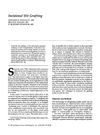Male Pattern Alopecia: Impact on Self-Esteem and Evolution of Hair Restoration Surgery
October 1997
in “
Dermatologic Clinics
”
male pattern baldness androgenetic alopecia hair restoration surgery punch grafts strip harvesting donor harvesting graft creation recipient site design graft planting postoperative care micrografting single-hair transplantation follicle cloning pharmacologic reversal male pattern baldness hair transplant hairline design hair grafting hair transplant aftercare hair cloning drug treatment for hair loss

TLDR The document concludes that advancements in hair restoration surgery have led to more natural results and patient satisfaction, with hope for future improvements in treatment.
The 1997 document reviews the impact of male pattern baldness on self-esteem and the evolution of hair restoration surgery. It notes that over 50% of men by age 60 will experience significant hair loss, primarily due to androgenetic alopecia. The document covers the transition from punch grafts to smaller grafts and strip harvesting, emphasizing realistic expectations and the psychological aspects of hair transplant surgery. It outlines the surgical process, including donor harvesting, graft creation, and recipient site design, stressing the importance of a natural-looking hairline and the critical nature of graft planting and postoperative care. The survival rate of grafts is noted to decrease over time, with 95% survival at 2 hours and 54% at 48 hours post-harvest. Postoperative care instructions are provided, and the shift from large grafts to micrografting and single-hair transplantation techniques is discussed, which produce more natural results. Full growth from grafts may take up to 12 months, and while results cannot be guaranteed, most patients are satisfied. The document concludes by highlighting the advancements in hair restoration, producing nearly undetectable results, and expresses hope for future treatments like follicle cloning or pharmacologic reversal.








